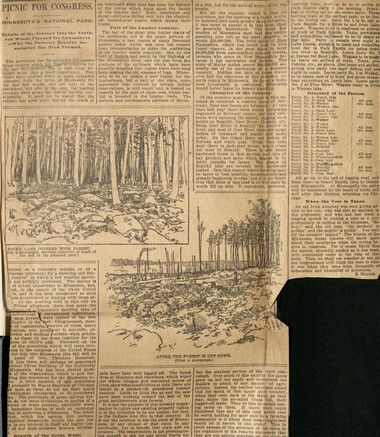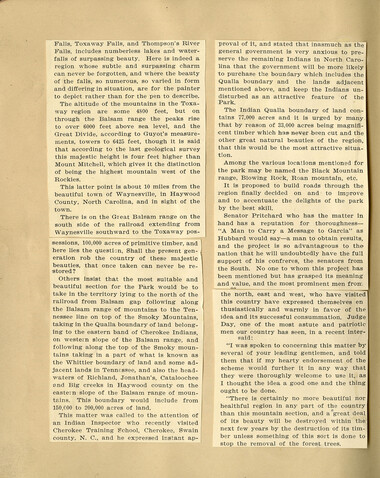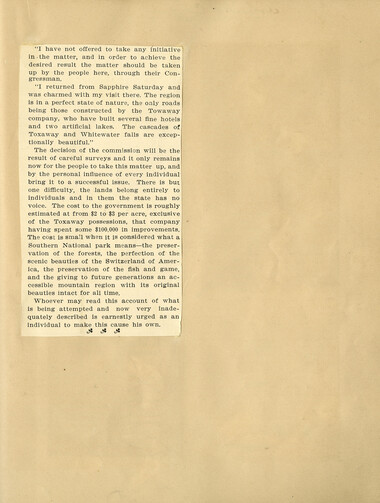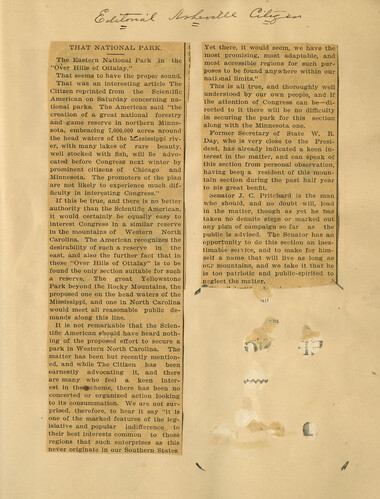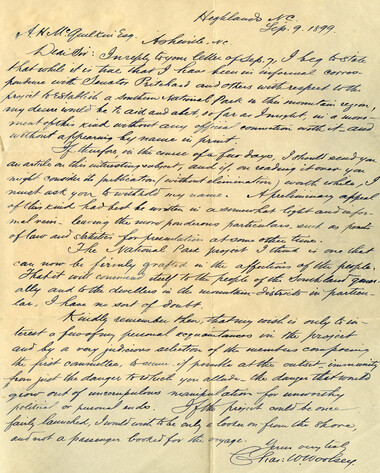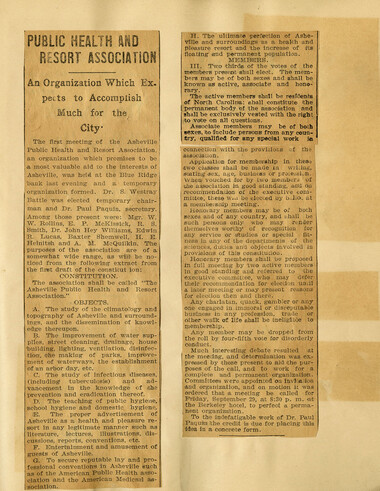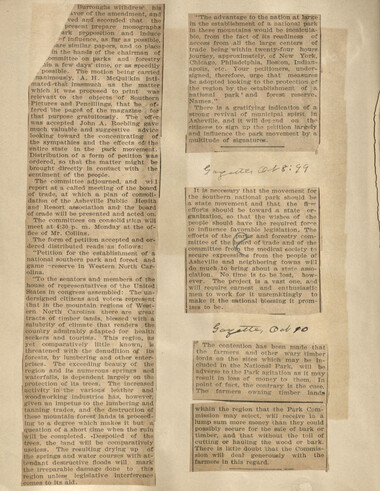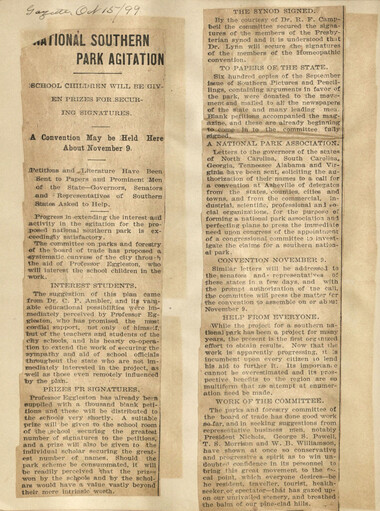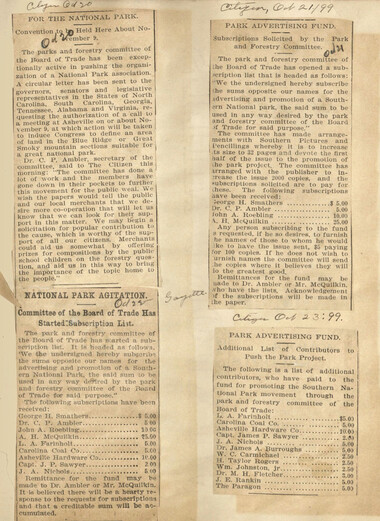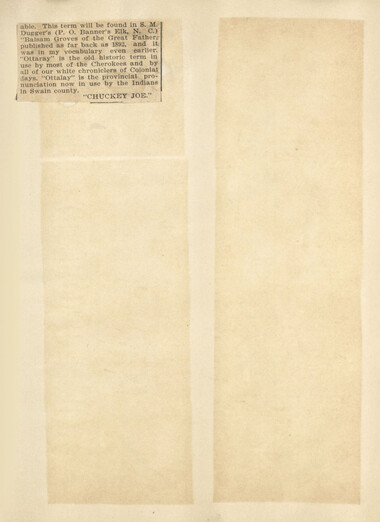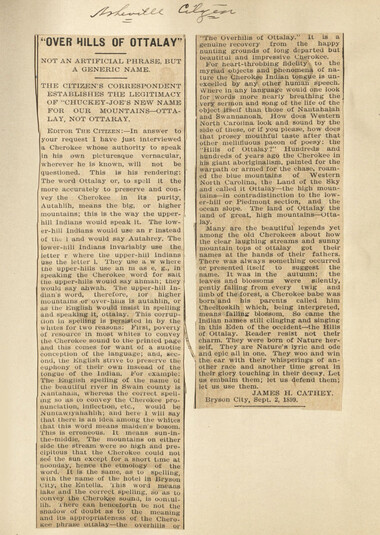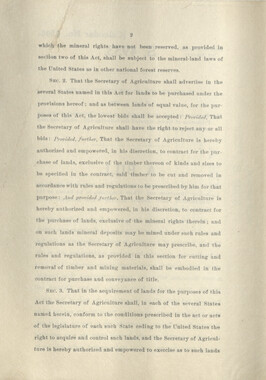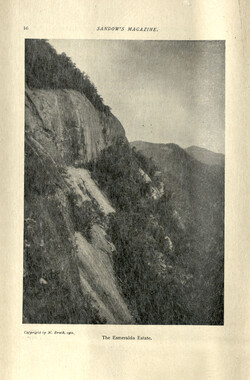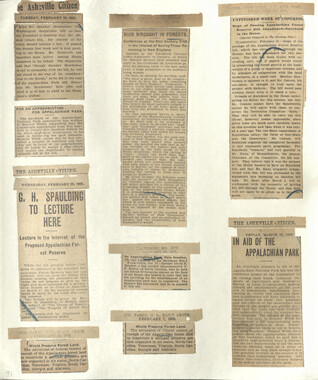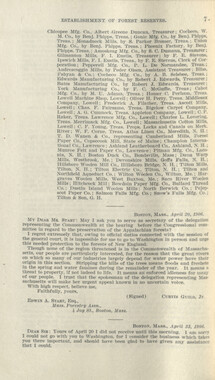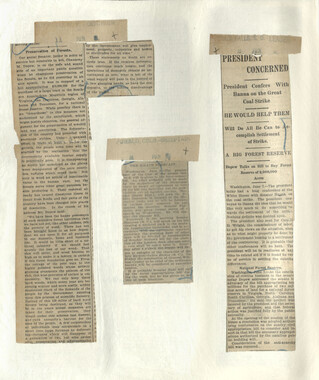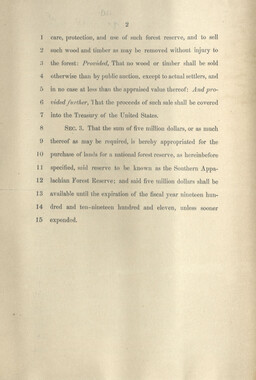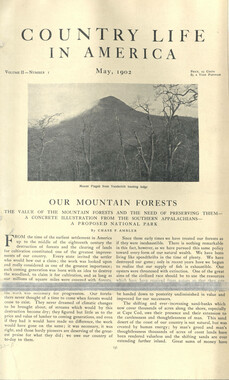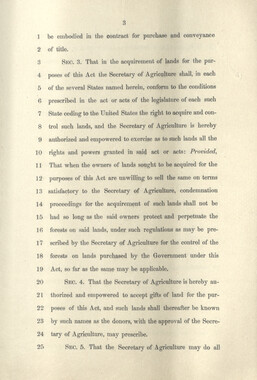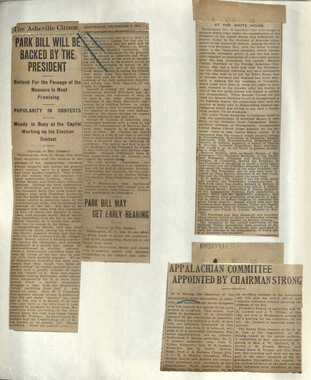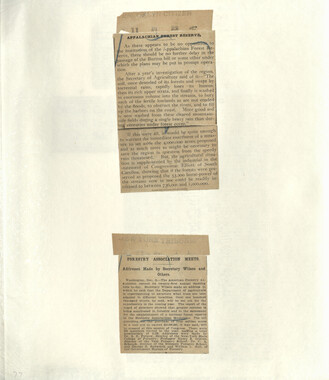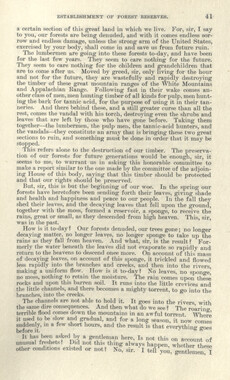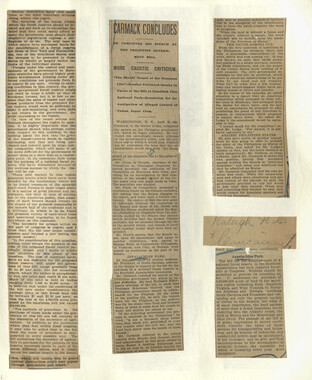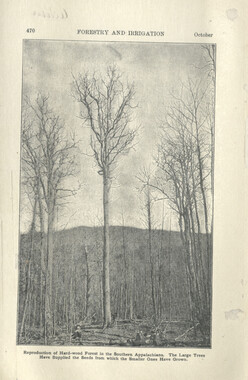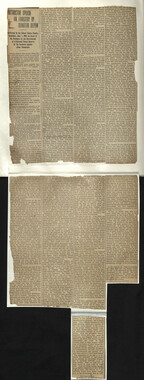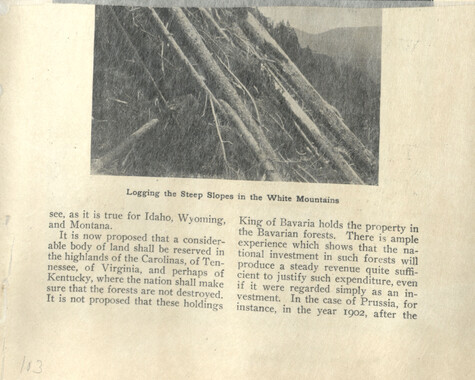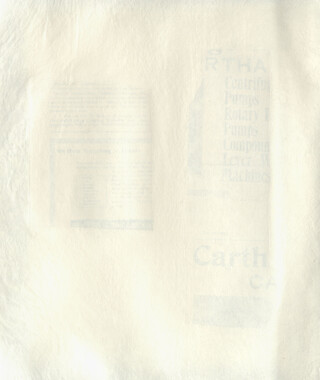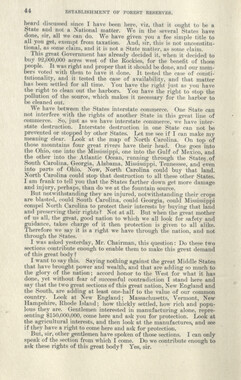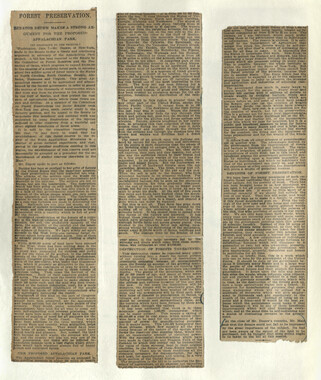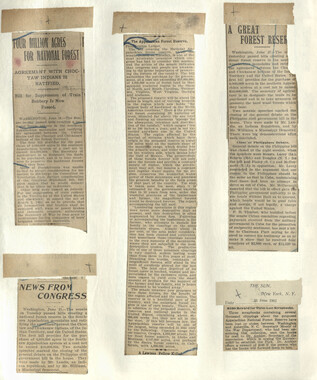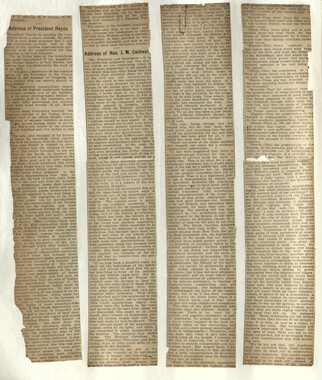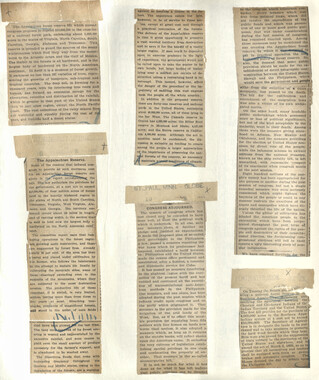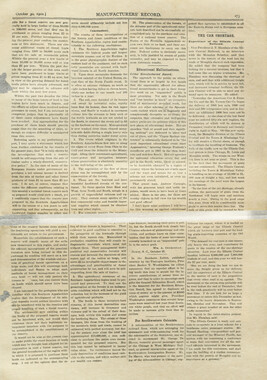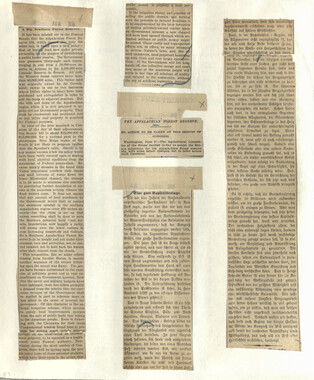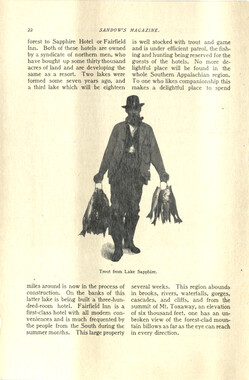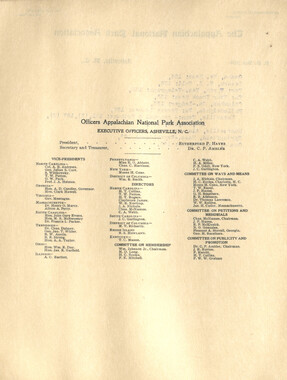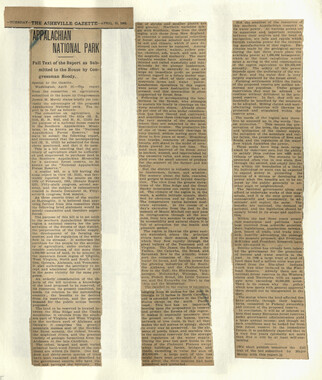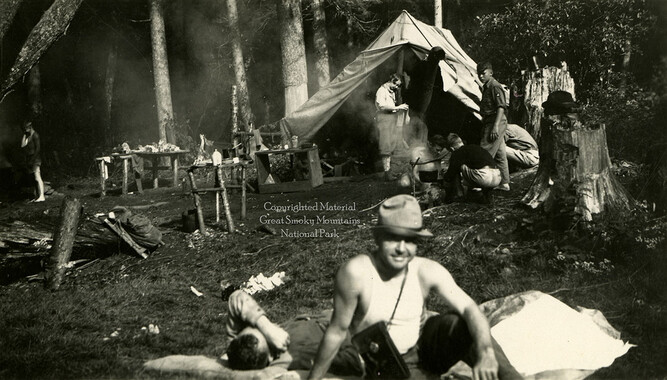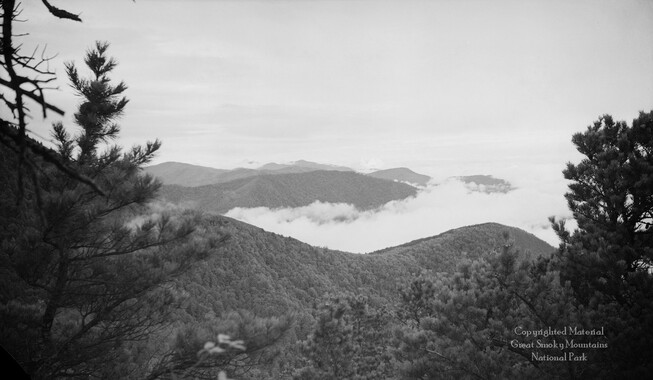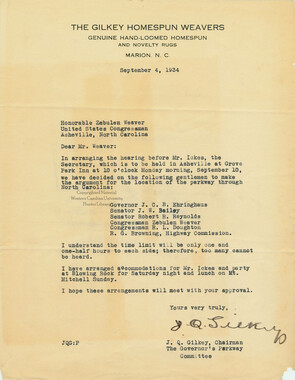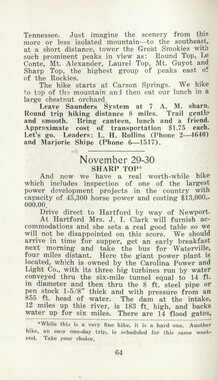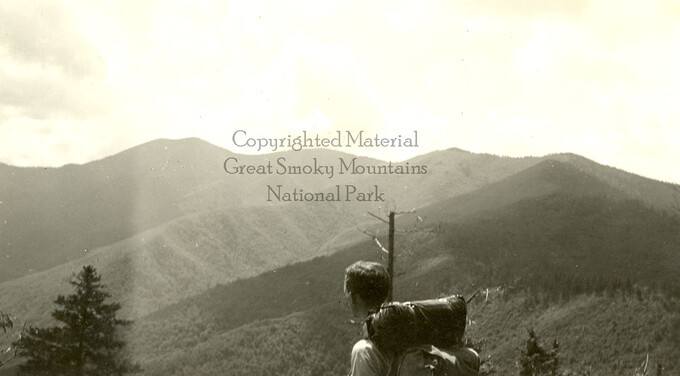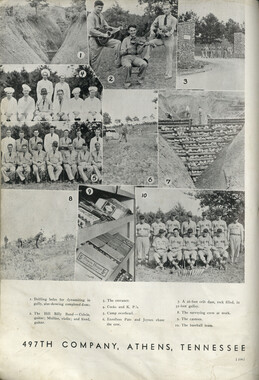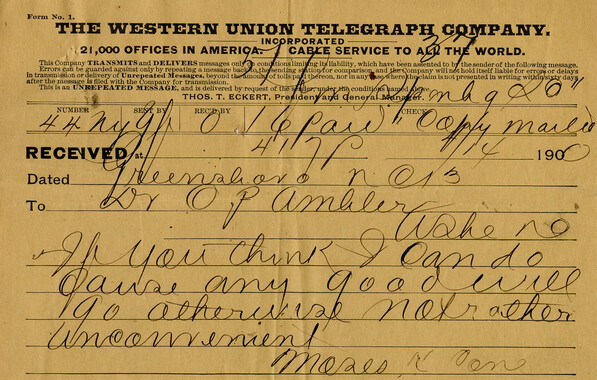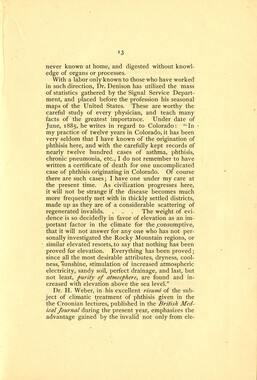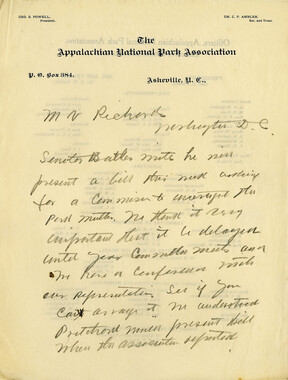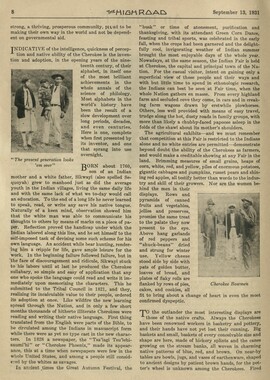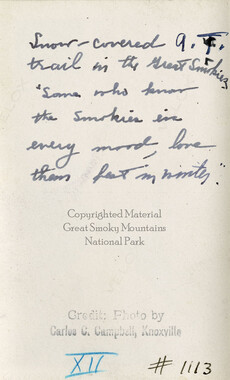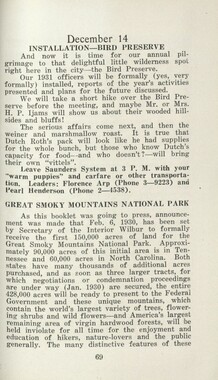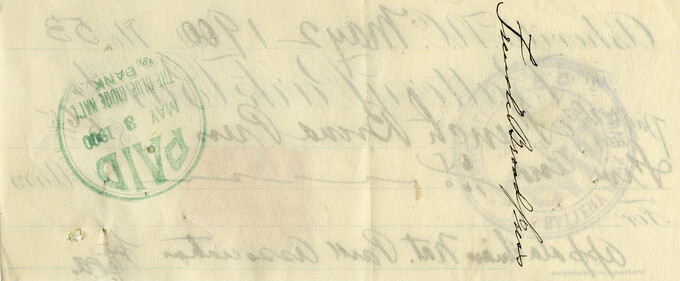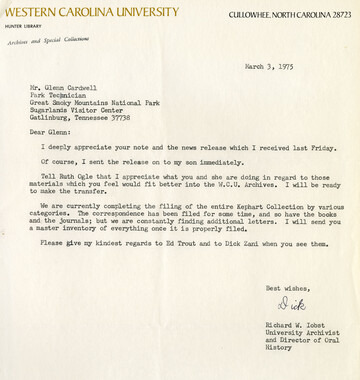Western Carolina University (20)
View all
- Canton Champion Fibre Company (2308)
- Cherokee Traditions (291)
- Civil War in Southern Appalachia (165)
- Craft Revival (1942)
- Great Smoky Mountains - A Park for America (2946)
- Highlights from Western Carolina University (430)
- Horace Kephart (941)
- Journeys Through Jackson (159)
- LGBTQIA+ Archive of Jackson County (85)
- Oral Histories of Western North Carolina (314)
- Picturing Appalachia (6873)
- Stories of Mountain Folk (413)
- Travel Western North Carolina (160)
- Western Carolina University Fine Art Museum Vitreograph Collection (129)
- Western Carolina University Herbarium (92)
- Western Carolina University: Making Memories (738)
- Western Carolina University Publications (2491)
- Western Carolina University Restricted Electronic Theses and Dissertations (146)
- Western North Carolina Regional Maps (71)
- World War II in Southern Appalachia (131)
University of North Carolina Asheville (6)
View all
- Appalachian National Park Association (53)
- Berry, Walter (76)
- Champion Fibre Company (5)
- Fromer, Irving Rhodes, 1913-1994 (70)
- Grant, George Alexander, 1891-1964 (96)
- Kephart, Horace, 1862-1931 (23)
- Masa, George, 1881-1933 (17)
- North Carolina Park Commission (105)
- Roth, Albert, 1890-1974 (142)
- Schenck, Carl Alwin, 1868-1955 (1)
- Stearns, I. K. (2)
- Thompson, James Edward, 1880-1976 (45)
- Weaver, Zebulon, 1872-1948 (55)
- Wilburn, Hiram Coleman, 1880-1967 (72)
- Allanstand Cottage Industries (0)
- Bennett, Kelly, 1890-1974 (0)
- Brasstown Carvers (0)
- Cain, Doreyl Ammons (0)
- Carver, George Washington, 1864?-1943 (0)
- Cathey, Joseph, 1803-1874 (0)
- Champion Paper and Fibre Company (0)
- Cherokee Indian Fair Association (0)
- Cherokee Language Program (0)
- Crittenden, Lorraine (0)
- Crowe, Amanda (0)
- Edmonston, Thomas Benton, 1842-1907 (0)
- Ensley, A. L. (Abraham Lincoln), 1865-1948 (0)
- George Butz (BFS 1907) (0)
- Goodrich, Frances Louisa (0)
- Heard, Marian Gladys (0)
- Kephart, Calvin, 1883-1969 (0)
- Kephart, Laura, 1862-1954 (0)
- Laney, Gideon Thomas, 1889-1976 (0)
- McElhinney, William Julian, 1896-1953 (0)
- Niggli, Josephina, 1910-1983 (0)
- Osborne, Kezia Stradley (0)
- Owens, Samuel Robert, 1918-1995 (0)
- Penland Weavers and Potters (0)
- Rhodes, Judy (0)
- Roberts, Vivienne (0)
- Sherrill's Photography Studio (0)
- Smith, Edward Clark (0)
- Southern Highland Handicraft Guild (0)
- Southern Highlanders, Inc. (0)
- Stalcup, Jesse Bryson (0)
- United States. Indian Arts and Crafts Board (0)
- USFS (0)
- Vance, Zebulon Baird, 1830-1894 (0)
- Western Carolina College (0)
- Western Carolina Teachers College (0)
- Western Carolina University (0)
- Western Carolina University. Mountain Heritage Center (0)
- Whitman, Walt, 1819-1892 (0)
- Williams, Isadora (0)
- 1810s (1)
- 1840s (1)
- 1850s (2)
- 1860s (3)
- 1870s (4)
- 1880s (7)
- 1890s (64)
- 1900s (294)
- 1910s (227)
- 1920s (461)
- 1930s (1765)
- 1940s (82)
- 1950s (15)
- 1960s (13)
- 1970s (47)
- 1980s (14)
- 1990s (16)
- 2000s (31)
- 2010s (1)
- 1600s (0)
- 1700s (0)
- 1800s (0)
- 1820s (0)
- 1830s (0)
- 2020s (0)
- Appalachian Region, Southern (81)
- Asheville (N.C.) (3)
- Avery County (N.C.) (6)
- Blount County (Tenn.) (193)
- Buncombe County (N.C.) (204)
- Cherokee County (N.C.) (10)
- Clay County (N.C.) (3)
- Graham County (N.C.) (108)
- Great Smoky Mountains National Park (N.C. and Tenn.) (447)
- Haywood County (N.C.) (305)
- Henderson County (N.C.) (13)
- Jackson County (N.C.) (58)
- Knox County (Tenn.) (31)
- Knoxville (Tenn.) (12)
- Lake Santeetlah (N.C.) (10)
- Macon County (N.C.) (25)
- Madison County (N.C.) (17)
- McDowell County (N.C.) (5)
- Mitchell County (N.C.) (7)
- Polk County (N.C.) (2)
- Qualla Boundary (22)
- Rutherford County (N.C.) (16)
- Swain County (N.C.) (533)
- Transylvania County (N.C.) (36)
- Watauga County (N.C.) (2)
- Waynesville (N.C.) (2)
- Yancey County (N.C.) (34)
- Aerial Views (3)
- Articles (1)
- Artifacts (object Genre) (4)
- Bibliographies (1)
- Clippings (information Artifacts) (77)
- Drawings (visual Works) (174)
- Envelopes (2)
- Financial Records (9)
- Fliers (printed Matter) (34)
- Guidebooks (1)
- Interviews (15)
- Land Surveys (102)
- Letters (correspondence) (219)
- Manuscripts (documents) (90)
- Maps (documents) (86)
- Memorandums (14)
- Minutes (administrative Records) (20)
- Negatives (photographs) (462)
- Newsletters (12)
- Paintings (visual Works) (1)
- Pen And Ink Drawings (1)
- Photographs (1657)
- Portraits (95)
- Postcards (15)
- Publications (documents) (107)
- Scrapbooks (3)
- Sheet Music (1)
- Songs (musical Compositions) (2)
- Sound Recordings (7)
- Speeches (documents) (11)
- Transcripts (46)
- Aerial Photographs (0)
- Albums (books) (0)
- Biography (general Genre) (0)
- Cards (information Artifacts) (0)
- Copybooks (instructional Materials) (0)
- Crafts (art Genres) (0)
- Depictions (visual Works) (0)
- Design Drawings (0)
- Exhibitions (events) (0)
- Facsimiles (reproductions) (0)
- Fiction (general Genre) (0)
- Glass Plate Negatives (0)
- Internegatives (0)
- Newspapers (0)
- Notebooks (0)
- Occupation Currency (0)
- Periodicals (0)
- Personal Narratives (0)
- Plans (maps) (0)
- Poetry (0)
- Programs (documents) (0)
- Questionnaires (0)
- Relief Prints (0)
- Sayings (literary Genre) (0)
- Slides (photographs) (0)
- Specimens (0)
- Text Messages (0)
- Tintypes (photographs) (0)
- Video Recordings (physical Artifacts) (0)
- Appalachian National Park Association Records (336)
- Carlos C. Campbell Collection (462)
- Cataloochee History Project (64)
- George Masa Collection (89)
- Hiram C. Wilburn Papers (28)
- Historic Photographs Collection (236)
- Horace Kephart Collection (126)
- Humbard Collection (33)
- Jim Thompson Collection (44)
- Love Family Papers (11)
- Map Collection (12)
- R.A. Romanes Collection (10)
- Smoky Mountains Hiking Club Collection (616)
- Zebulon Weaver Collection (107)
- A.L. Ensley Collection (0)
- Appalachian Industrial School Records (0)
- Axley-Meroney Collection (0)
- Bayard Wootten Photograph Collection (0)
- Bethel Rural Community Organization Collection (0)
- Blumer Collection (0)
- C.W. Slagle Collection (0)
- Canton Area Historical Museum (0)
- Cherokee Studies Collection (0)
- Daisy Dame Photograph Album (0)
- Daniel Boone VI Collection (0)
- Doris Ulmann Photograph Collection (0)
- Elizabeth H. Lasley Collection (0)
- Elizabeth Woolworth Szold Fleharty Collection (0)
- Frank Fry Collection (0)
- Gideon Laney Collection (0)
- Hazel Scarborough Collection (0)
- Hunter and Weaver Families Collection (0)
- I. D. Blumenthal Collection (0)
- Isadora Williams Collection (0)
- Jesse Bryson Stalcup Collection (0)
- John B. Battle Collection (0)
- John C. Campbell Folk School Records (0)
- John Parris Collection (0)
- Judaculla Rock project (0)
- Kelly Bennett Collection (0)
- Major Wiley Parris Civil War Letters (0)
- McFee-Misemer Civil War Letters (0)
- Mountain Heritage Center Collection (0)
- Norburn - Robertson - Thomson Families Collection (0)
- Pauline Hood Collection (0)
- Pre-Guild Collection (0)
- Qualla Arts and Crafts Mutual Collection (0)
- Rosser H. Taylor Collection (0)
- Samuel Robert Owens Collection (0)
- Sara Madison Collection (0)
- Sherrill Studio Photo Collection (0)
- Stories of Mountain Folk - Radio Programs (0)
- The Reporter, Western Carolina University (0)
- Venoy and Elizabeth Reed Collection (0)
- WCU Gender and Sexuality Oral History Project (0)
- WCU Mountain Heritage Center Oral Histories (0)
- WCU Oral History Collection - Mountain People, Mountain Lives (0)
- WCU Students Newspapers Collection (0)
- Western North Carolina Tomorrow Black Oral History Project (0)
- William Williams Stringfield Collection (0)
- Appalachian Trail (22)
- Church buildings (9)
- Civilian Conservation Corps (U.S.) (92)
- Dams (21)
- Floods (1)
- Forest conservation (11)
- Forests and forestry (42)
- Great Smoky Mountains National Park (N.C. and Tenn.) (82)
- Hunting (2)
- Logging (29)
- Maps (73)
- North Carolina -- Maps (5)
- Postcards (15)
- Railroad trains (8)
- Sports (4)
- Storytelling (2)
- Waterfalls -- Great Smoky Mountains (N.C. and Tenn.) (39)
- African Americans (0)
- Artisans (0)
- Cherokee art (0)
- Cherokee artists -- North Carolina (0)
- Cherokee language (0)
- Cherokee pottery (0)
- Cherokee women (0)
- College student newspapers and periodicals (0)
- Dance (0)
- Education (0)
- Folk music (0)
- Forced removal, 1813-1903 (0)
- Gender nonconformity (0)
- Landscape photography (0)
- Mines and mineral resources (0)
- Paper industry (0)
- Pottery (0)
- Rural electrification -- North Carolina, Western (0)
- School integration -- Southern States (0)
- Segregation -- North Carolina, Western (0)
- Slavery (0)
- Weaving -- Appalachian Region, Southern (0)
- Wood-carving -- Appalachian Region, Southern (0)
- World War, 1939-1945 (0)
- Sound (7)
- StillImage (2352)
- Text (654)
- MovingImage (0)
Scrapbook by A. H. McQuilkin
Item
Item’s are ‘child’ level descriptions to ‘parent’ objects, (e.g. one page of a whole book).
-
-
PICNIC FOE CONGRESS. MINNESOTA'S NATIONAL PARK. Details of the Journey Into the Northern Woods Planned for Lawmakers —Why the Forestry Reserve Vs- Hoeintlon iihn Been Formed, The mov. forest ': "ss for at tbh age at- Few havi tier or mow extended nt from the press of Minnesota for the last few weeks, and not only in the northwest, but alio In the east, the Leading journals have giver; the matter careful consideration. It need inn be stated that the subject has gone quit,? beyond the reach of on westward what then has been the history of the towns which hung upon the flanks of the lumber belt? Ruin, desolation and decay—pictures fitting well into the slashed- off. burned-over region which makes their frame. Fate of the Lumber Country. The last of the great pine timber tracts of the northwest lies In the upper portion of Minnesota, a vast region of many thousand square miles which was once too remote from transportation to make the marketing of Its lumber easily practical. Out by the port of Duluth and south by the highway of the Mississippi river, and out also from the stations of the railroads which have been Iteadtly Invading that region there have long been coming the old streams of logs. Minnesota Is by no means a new region for the lumberman, but a part of the state, more especially that covered by certain Indian reservations, is still uncut, and is looked on eagerly by the eyes of those men whose capital is invested in the lumber trade. The eastern and northeastern portions of Mlnne- of a few, but for the sake of manv, of all the people. Not all the summer travel Is Hi sportsmen, yet the sporting is a factor be despised,and much greater as ao industry, if one cares to phrase it In that "way, than is generally understood. The state fire warden of Minnesota says that the entire standing pine left as the state property is worth $10,000,000. The lift ' Www Hampshire, which you could loss* in this forest reserve. In one year takt!S ln over $6,000,000 from non-resident summer travel, persons who come to New Hampshire because It has mountains and forests. The state of Maine makes nearer $60,000,000 annually out of its reputation as a summer country. Neither nor both of these states ever had the resources of this proposed reserve region In Minnesota. So far as a business investment is concerned, Minnesota would better leave Its forests star < Intruder of the t'onntry- Of the counties most concerned ln this attempt to establish a reserve those of Beltrami, Cass and Itasca are foremost. Al this time last year there were eleven townships organized in Beltrami county, and two rail- were entering the region, tapping such points as Bemidji, Deer River, CloQU''. From Deer River to Bemidji the coun' level, and west of Deer River there are large bodies of tamarack and poplar and some cedar. On the ridges there are bodies of Norway and white pine. From Cass lake west there is Jack-pine forest, which runs out west of Bemidji. There la also some hardwood forest in that section, and bits of hay grounds and spots which appear to be fairly suitable for farms. The shores of Bemidji lake are covered with hardwood timber. Into this region, where farming may be more or less possible, homesteaders are already beginning to edge, and It is no doubt true that some of this land Is or will soon be worth $25 an acre. It represents, however, I ROCKY LAND COVERED WITH FOREST, lrom a photograph, showing ebaructer of much of the soil Id the proposed park.) Itlcism as a visionary scheme or as a Toposed movement for a shooting and fish- | reserve" in which a few wealthy sports- *a are selfishly interested. The matter is of actual importance to Minnesota, and, <ed, to the people of the whole United ■>s, and it has been recognized as such Vien accustomed to dealing with large af- i. At the meeting held in this city on \Friday afternoon there was more the isa««n»Vi£«iVle8's'ative meeting than of age yt unorganized Individuals. nun present were typical of the best lllzatlon of theTWst. Congressmen, mem- of legislatures.Tpayors of cities, heavy Jltalists. men promTJcnt in scientific, ed- Itional and medical (natters—such gentle- as these do not oome together for the Ipose of child's plajy. Foremost on the I of the committee which will issue invi- loni to the congress of the United States " the trip Into Minnesota this fall will be narns of Gov. Theodore Roosevelt, him there will perhaps be associated sident Cyrus Northrop of the University llnnesota, who has been elected presl- of the organization which Is now turning this movement for the Minnesota re- ^e. A third member of this committee probably be Mayor Harrison of Chicago, h men as these do not set their hands whimsical enterprises or ill-considered as. The presidents of great railway sys- os do uot issue Invitations to parties of a Ddred or moro persons, especially when Immediate design of such an excursion Jthat of exploring a wilderness. The whole | which has sprung Into perhaps Expected magnitude within the last few |ra, is one unusual In itself and highly typ- of our high-pressure western clviliza- flrowtb ot the Great West. AFTER THE FOREST IS CUT DOWN. (From a photograph.) sota have been well logged off. The forest fires at Hinckley and elsewhere, which wiped out whole villages and destroyed scores of lives,showwhatpossibilltiesof ruin there are latent in a slashed-off, abandoned lumber country. Little by little the ax and the saw have been working toward the last of the great northwestern pine forests. It is not the purpose of this forestry organization to injure any existing property rights. It Is the Intention to be not unjust, but Just, to the Indians who live In that country. It is not the intenlon to rob the state of Minnesota, or any citizen of that state, In any particular, but to benefit that state and Its citizens. The organization Is not presumptuous enough to ask for any given limits for but the smallest portion of the tract concerned. Over much of this country the pines grow on soil too sandy and sometimes too shallow to admit of any manner bt agriculture. Indeed, the lumber interests admit this for much of this upper pine country, when they cede back to the state, as they may, under the so-called Cross bill, their logged-off lands. They do this to escape paying taxes on them. If there were much likelihood that any of this land would ever be worth holding for later sale to a farming community is it likely that these capitalists would let it revert to the Btato? This Is proof enough of the accuracy of the claim of the organizers of the reserve movement that they are not asking coneress or +h«. .i.io «f ;ug time, ev.r ii g, so as to arrive in Park Rapids early n {he morning. Breakfast in dining car for the entire party. Those g train at the earliest point to be first in the dining ear. Party No. 1 to be left at Park Bapids for a drive to and from Lake Itasca. Wagons to.be in readiness on arrival of train at Park R raids. Tents, provisions and even thins Uo.'issary to be in shape at the lake. Party . j remain over night at Lake Itasca, sleeping In tents and returning next day to Park Rapids (or going down the river to Bemidji). Leave party No. 2 at Dorset for Sand Lake. Wagons to be ready to leave on arrival of train. Tents, provisions, etc., as above. Also boats and guides, giving this party two days' fishing and one night in camp. Leave party No. 3 at Walker, to be taken care of ln hotel and given steamboat excursions on Leech lake. Leave party No. 4 at Pine River. Wagons ready to drive to Woman lake. Itinerary ot the Parties. Party No. 1—Itasca lake Party No. 2—Sand Inke Party No. .3— Walker Party No. 4—Woman lake Party No. Parly No. Farty No. arty No. Party No. Party No. Party No. Parly No. Party No. Party No. Party No. Party No. Parly No. Party No. ties. All stay two daya. All atay two days. All stay two dayi. All atay two days. All stay All atay one day. All stay one day. 1—Sand Lake 2—Itasca lake 3—Woman luke 4—Walker 1 Walker -' Walker 3—Sand Lake 4—Itasea lake 1—Woman lake - -Woman lake 3—Itasca lake 4—Bemidji 1—Remltlti 2—Cass lak" Party No. 3- Winn, h Party No. 4 Case Party No. 4- WlnHbogoahijh Party No. S—Bemidji Parly No. 2-BemMjl Part? No. 1 Caas lake All go up to the end of logging road, and from there to Grand Rapids, then to Duluth and Minneapolis. At Minneapolis the party will be banqueted by the board of trade, and Will after that disband, returning via Chicago. When the Vote Is Taken. An old Irish attorney was once giving advice to his son, who was also an aspirant ln the profession and who had just made a ringing speech in stating a case to a Jury preliminary to calling in the witnesses. "Me boy." said the old man, "the declarin' is nothin", and the argyln' Is nothln'. You watt till the swearin' begins." The friends of the Minnesota forest reserve will know more about their enterprise when the voting begins in congress. Yet It seems likely that the matter, shrewdly pushed as it has been, will eventually come to the vote of that body. Then we shall see whether or not all our congressmen still think the west is what it was when they were boys, incapable of exhaustion and unneedful of protection. E. Houqh.
Object
Object’s are ‘parent’ level descriptions to ‘children’ items, (e.g. a book with pages).
-
This 37-page scrapbook was put together by A. H. McQuilkin, a Chicago-based editor who moved to Asheville, North Carolina in the mid-1890s. The scrapbook starts out with an article from one of McQulkin’s own publications, “Southern Pictures and Pencillings,” but also includes clippings from other sources including the “Asheville Citizen.” Most of the clippings date to 1899. McQuilkin and Ambler were founding members of the Appalachian National Park Association, which promoted the idea of a national park in the southern Appalachians. The association disbanded in 1905. The frontispiece of the book is inscribed “Per C. P. Ambler/1929,” the date Ambler donated the material to the State Archives.
-
